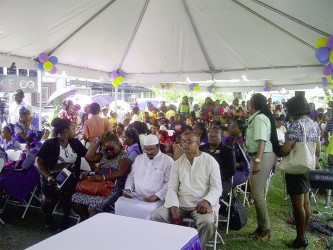The Ministry of Education yesterday launched a five-year National Revised Literacy Action Plan that aims to ensure that every student is a reader by Grade Four.
The launch, which took place along the Main Street Avenue and coincided with International Literacy Day, was hosted under the theme, “The literacy revolution has begun.”
The action plan was outlined by the Minister of Education Priya Manickchand, who said that a literacy test was conducted from grades One to Six and found a 32% grade level literacy rate. “That does not mean the other children could not read,” she said, while urging the media not to sensationalise the finding. “I am not suggesting that 68% of the (Primary) school population is illiterate… but rather 32% was reading at grade level, which was way too low for us.”
Specific goals of the revised action plan that the ministry sought to highlight in an accompanying brochure is to have every child a reader by Grade Four, a 60% pass rate at the National Grade Six Assessment, a 65% pass rate at the National Grade Two and Four Assessments and 50% passes with Grades 1 to 5 at Caribbean Secondary Education Certificate (CSEC) Examinations.

The action plan envisages four strategic outcomes. The first strategic outcome is to have stakeholder alliance/support for literacy improved. To achieve this, schools will be mandated to ensure that every effort is made so that children can read at Grade Four. Another specific action that will be taken is to establish reading tents/ centres around the country, where public officials will read so as to stimulate interest in reading. Further efforts to achieve this goal include literacy awareness programmes conducted via television, radio, text messages, Facebook, panel discussions, and classes for parents with reading difficulties. In addition, businesses, clinics, government agencies and managers of public places will be asked to create literacy-friendly environments by displaying various charts for interaction with children and members of the public. Also, resource materials will be given to parents indicating how they can enhance the ability of their children.
The second strategic outcome is improving of teachers’ capacity to implement an effective literacy programme. The ministry hopes to achieve this goal by conducting massive training and retraining of teachers to deliver literacy programmes countrywide along with the training of head teachers as instructional leaders to better enable them to guide teachers. Additional measures for the achievement of this goal include the facilitation of remediation through specialist teachers at foundational classes.
The third strategic outcome is the development or implementation of supportive materials to improve literacy throughout the education sector. It is expected that realizing this outcome rests on the establishment of reading clubs and libraries in every school, utilisation/implementation of locally produced readers with established literary standards and benchmarks and through the creation of learning packages for absentee children to help them to catch up.
The fourth strategic outcome is an improved monitoring and supportive supervision for teachers to seriously tighten the monitoring aspect of teachers and pupils. To undertake this feat, every school will be required to have a school improvement plan with a literacy component and literacy committees will be established in every school to assess performance of pupils and strategies for improvement, within an accountability framework to assess class performance of teachers, subsequent to which appropriate actions will be taken. The latter point was emphasized by the minister. Further measures to achieve this goal include a diagnostic assessment of each pupil nationally to determine the literacy levels of pupils with the view of developing appropriate action plans for remediation, action research in classrooms to determine issues affecting pupils with the intention of resolving them, and effective supervision of the literacy programmes of schools by District Education Officers.
The event was attended by scores of pupils from a cross section of public schools as well as teachers from those schools, along with Ministry of Education officials. Chief Education Officer, Olato Sam and his deputy, Marcel Hutson also delivered remarks on the importance of literacy and emphasised the need for everyone to become involved. There was a poem recited by a student of the Bishops’ High School, a dramatic sketch performed by some adults and a song sung by three girls from the Guyana Society for the Blind, which all emphasized the importance of literacy. There were several tents with teaching aids, charts and posters on display, along with a large exhibition of books for distribution to the public.




